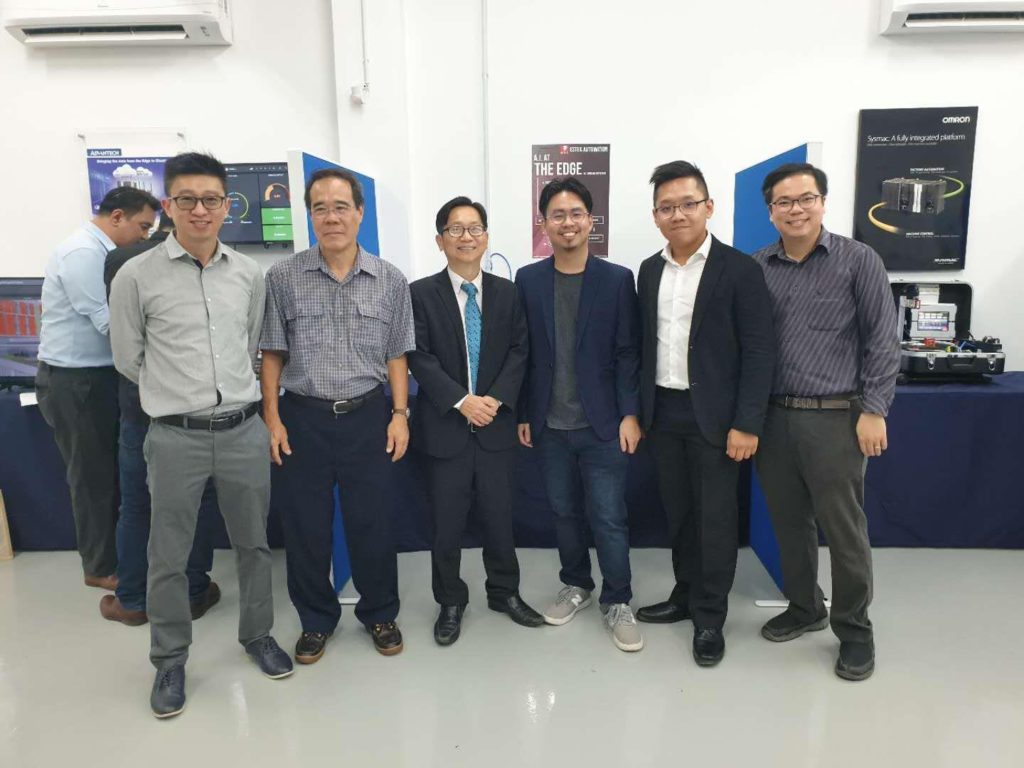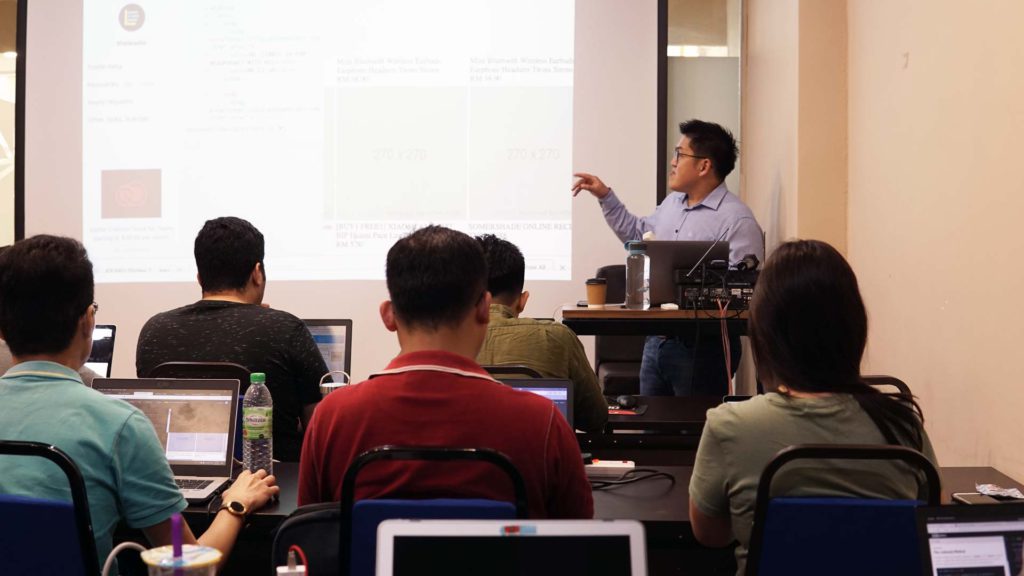This week, we talk to Ru Sern, a talented individual who wears multiple hats in web development, data science, and currently a senior R&D engineer at a local automation company.
Ru Sern was a student in Full Stack 360 and we wanted to learn about his experience in the data & automation industry in Malaysia, getting out some key learnings for you.
Let’s get started.
Tell us about yourself.
If there were one thing that would best describe myself, I would say that I’m an introvert. The voice in my head is definitely louder than the one that comes out of my mouth.
Generally, I am quite a low-energy kind of person, but I do get quite excited when it comes to technology and projects that I am passionate about.
Editor note: The world perceives that successful people must be opinionated and extroverted – loud. But the opposite is also true for many successful people, for example – Bill Gates.
Watch this amazing video by Susan Cain, author of Quiet – who argues about the power of introverts.
Where do you currently work at?
I currently work at Estek Automation, doing research and development for the company. I tend to see myself as a tinkerer and a technical person, someone who likes to dabble in the complexities of engineering.
Since young, I have been passionate about robotics and mechanical systems. Hence, my choice of coming to a local automation company, where I would have more creative freedom to explore my interests.
Being a ‘full-stack’ engineer, my abilities span over a wide range from electronics, electrical, mechanical and currently into the software side of things.
You might find that I’ve spread my expertise quite thinly, but being where I am now, this generalization of my skills has had its advantages – and I think it will for many of you as well.
What keeps you busy when you’re not working?
I am quite a movie geek, and a lot of my time is spent catching up on either my favourite movies or TV-series. Game of Thrones, Breaking Bad, Sherlock, you name it, I’ve probably watched it! (Currently I am waiting for the new season of Westworld).
Otherwise, I would either be at some tech event or talk, trying to pick up some new piece of knowledge. I am also an avid reader, and my reading habits lean towards the non-fiction stuff, usually those that could help me understand something a little better.
I also used to dabble into photography and cinematography quite a bit, but recently I haven’t gone out to shoot anything new.
How does a day in your work life look like?
Every day in my work life is quite different. Being in a smaller company, things do tend to shift around. Nowadays my work revolves around software development.
The kind of research and development that I do lean more towards the application side, and spend my time putting things together and solving customer’s problems. But if there is one consistent thing, it’s Google! I may not work at Google, but I Google at work. (Cold joke there)
Most of my time is spent figuring out how to get new projects to work, usually something related to machine vision or machine learning; reading documentation, reading up articles on new ideas, or simply code syntax that has slipped my mind.
During your tenure in Vitrox, you’ve worked on some very interesting projects, is there something interesting you could share?
During my tenure in Vitrox, I actually had quite a different job scope. I was working in the mechanical R&D team.
As a mechanical engineer, I was tasked to design the mechanical parts that go into an automated visual inspection (AVI) module, and it involved a lot of computer-aided design (CAD) work.
Sometimes, I also designed the electronics for the lighting systems that go along with the AVI systems.
What do you love most about your current workplace?
What I love the most about my current workplace is the ability and freedom to explore. Being in the automation industry, we tend to get many different requests, and projects that vary in nature.
There has always been an industry adage to specialize in a single field. However, I’ve always been too distracted to stay in a single field of engineering/technology.

My academic background has been varied, but it has come in useful in my current job as I take on new development projects, having a complete understanding of the entire automation system.
At my current workplace, I get to dabble in different technologies and continue to feed my curiosity.
With skillsets in robotics, automation engineering, AI, what made you join Full Stack 360?
I had been following LEAD and Dr Lau’s team for quite a while and joined many of their webinars before.
I joined Full Stack 360 because I have never taken any web programming classes in my engineering degree days.
For me, I already understood programming, but I didn’t have knowledge in the web architecture, and Full Stack 360 was a neat crash course to give me the overview I needed to adapt to the parts that I needed.

Full Stack 360: Learn to build market-ready web applications.
What’s something you can share from joining practical courses like Full Stack 360, or taking courses at Coursera as compared to your academic experience?
I think the general approach to learning and teaching is quite different. In academics, the information fed is usually from the bottom up, where the emphasis is given on theory.
Weeks and months are spent building on low-level ideas, but rarely are the practical aspects pointed out.
However, according to the Pareto principle, 80% of the time we will only really need 20% of the knowledge. That’s not to say that we should forsake the fundamentals, but I think the learning emphasis should be reversed, where students are given the big idea first, before working their way downwards to the low-level fundamentals.
Learning should also be more practice-driven. I think a course like Full Stack 360 has this idea in mind when teaching, which allows students to have a clearer understanding of why they are studying what they are being taught, and how to actually put things to practice.
We have easy access to knowledge nowadays via the web. Taking from my experience, the hardest part is not getting access to new knowledge, but actually not knowing what we don’t know. (take a moment to digest that, haha).
If we know what it is we don’t know, we can just look up the 80% that we do know yet whenever we need to, because we already understand where to look for it. (sort of like Just-In-Time(JIT) learning. Sorry, a manufacturing joke. haha)
The academics are only starting to realise this and revamping their syllabus. At Full Stack 360, Dr Lau even points us where to look next, and free refreshers whenever we need it.
With your skills front-end and back-end web programming – how are you applying it in your work-life?
I’m applying it by adapting the code that I write to take on a more distributed web-based architecture. I think it has been quite useful, especially when I am mixing libraries from different languages.
When working with machine learning, I think we can’t really escape from the popular machine learning libraries like Tensorflow, Pytorch, Scikit-learn etc. These libraries tend to favor Python as the main language.
However, in enterprise development, the favoured programming languages tend to be the more old school ones like C, C++, C# and Java. Using a web-like architecture, and I can mix and match to my liking.
In your opinion, what will the data and automation industry look like in the future?
I think the manufacturing industry has been slower to adopt data than most others. Or at least, in Malaysia. However, the industry is starting to gain awareness of how to leverage data and automation, and our government is giving a lot of incentives to the local players under the Industry4WRD initiative.
The change may be slow and gradual, but it is changing. Hopefully, the industry will gain a better appreciation for generalists, rather than just specialists.
For the automation industry, I think it will become more intertwined with data in order to achieve greater levels of autonomy and intelligence. That’s what all the buzz about Industry 4.0 has been about.
The adoption has been slow, as architecture to support such data-driven systems are yet in place. Most systems deployed in the manufacturing industry are still silo-ed, without the connectivity for a true data-driven system.
With that said, the early adopters will definitely have a leg up in the game, and the same goes for the individuals/engineers that learn these skills now.
What is your advice(s) for individuals looking to enter the industry? Pick up web development? Data Science? AI? Why?
I think that people should start off with a blend of web development and Data Science. I think web development is like the architecture that enables all the technologies that we have in Data Science and AI now.
For me, I started off with AI particularly in Deep Learning for computer vision. At that time, I struggled with it because although I could understand the theory behind things like Convolutional Neural Networks(CNN) and the like, I didn’t have the architecture knowledge to properly deploy the models I built.
Then I worked my way backwards to Data Science and web, and I think having this knowledge first before going into AI, I would have had a better idea how to make AI models that were useful.
Of course, these three fields are a really big piece of the pie, and I think it is really important to be patient in the journey of learning. Again, the 80/20 rule very much applies here! So for those intrigued by AI, I think the type of AI right now really isn’t the type from fantasy yet.
AI is just another tool, but it is only useful when used right. Before we even get to the stage of deploying AI, I think the right data infrastructure and pipeline that AI can capitalize on needs to be built first.
Here, when I am talking about AI, I am referencing the machine learning branch of AI. If you’re starting out in the bigger umbrella of artificial intelligence, then it is a whole other thing.
If you could send a message to yourself 5 years ago, what would you tell your younger self?
If I could send a message back to myself 5 years ago, or better yet, to myself 10 years ago, I would tell myself that there is more to learning than just school or college and that there is a fountain of knowledge out there up for grabs.
But more importantly, I think I would tell myself to be more active in the pursuit of my dreams/desires and to come out of my shell a little more.
It pays to be different, and it’s okay to leave the safety of the herd. Also, I think I would have told myself to pick up web development a lot sooner. Haha (maybe invest in bitcoin too.)
We hope this interview with Ru Sern gave you good insights and open up some areas for thoughts. What are the challenges you face in your journey of picking up web development?
Let us know in the comment section below.



0 Comments